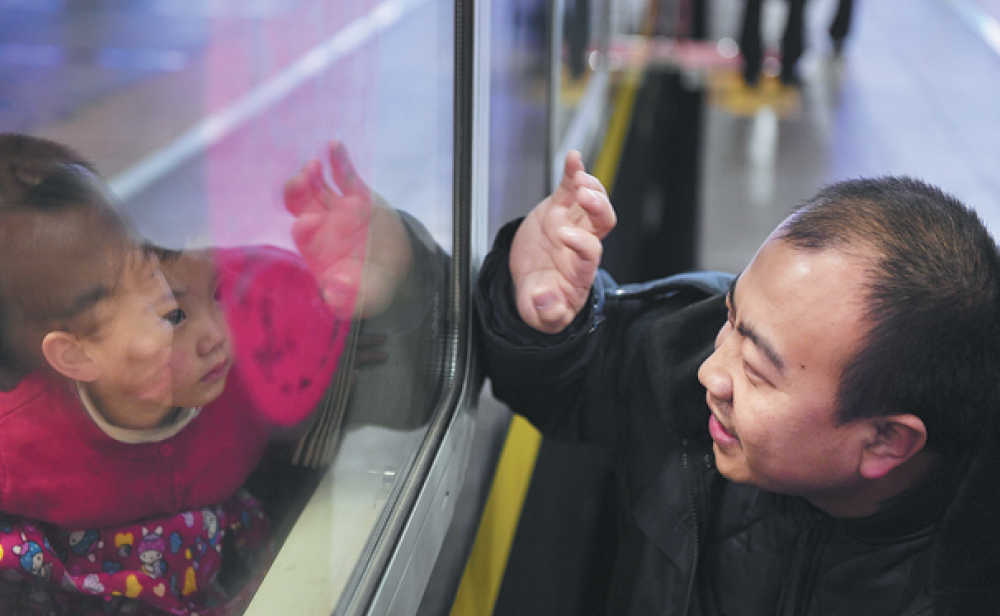


Wang Changfu (right) waves to his daughter at Beijing Railway Station on Friday. The Spring Festival travel rush that started on Friday unleashed the world's largest annual human migration. [Ju Huanzong / Xinhua]
China will better cope this year with the heavy traffic during the Spring Festival travel rush, with some 3 billion trips set to be made, as technologies from cloud computing to artificial intelligence kicked in to help cope with anticipated and unexpected congestion.
The 40-day travel rush that started on Friday unleashed the world's largest annual human migration — 15 days ahead of the Lunar New Year — as families reunite for China's most important traditional holiday.
According to the National Development and Reform Commission, the Lunar New Year, which falls on Jan 25 this year, the earliest in the past eight years, will test both the transport system and the nerves of those caught up in it since the return trips of college students overlap with the travel rush.
In a bid to better manage the traffic peak, the Ministry of Transport said it will make full use of technologies such as big data to enhance connectivity and efficiency between multiple modes of transportation by dispatching more public transport vehicles, buses and taxis to transportation hubs including railway stations, airports and tourist attractions.
Alibaba Cloud, the nation's top cloud computing provider, has also rolled out a suite of offerings including data analytics, stronger computing power and the internet of things to help take the stress out of the festive journeys.
Xiao Lu, general manager of smart traffic business at Alibaba Cloud, said that data intelligence solutions on Alibaba Cloud, which supports a variety of clients such as railway ticketing app 12306, major airlines and highway operators, will help predict when peak periods draw near and suggest pre-emptive countermeasures.
"Data intelligence is widely applied across all scenarios in holiday traffic. By utilizing these cloud technologies, we can precisely pinpoint a route for circumventing congestion and save time," Xiao said, adding that this will help provide real-time traffic alerts to the public and allocate resources in advance to alleviate traffic jams.
The number of road trips, according to the Ministry of Transport, is projected to reach around 2.43 billion during the travel rush. With growing risks of accidents due to the large number of vehicles on the road, the traffic faces tougher challenges and is in greater need of new technologies to cope with such a huge passenger flow.
To be more specific, Amap, the Alibaba-owned digital mapping service with 100 million daily active users, will predict traffic conditions with a 30-minute lead time so that drivers can avoid traffic jams and take on alternative routes even before congestion takes place, said Wu Zeju, who oversees smart traffic solutions at Amap.
Should an accident happen, connected infrastructure such as vehicles, road blocks and even vests worn by rescue teams will send signals to a central command platform, which then informs traffic authorities in charge and Amap users, Wu noted.
"Machine learning manages to identify any accidents or malfunctions in real time, which is much more efficient than the human eye," said Zhao Shengqiang, a senior engineer responsible for Alibaba Cloud architecture.
"And it greatly shortens the time for problem detection to 10 to 20 seconds, allowing the transportation platforms to take measures in a more efficient manner and consequently reduce the likelihood of traffic congestion."
Didi Chuxing, a ride-hailing company, also said it will keep applying artificial intelligence technologies to detect driver fatigue during the travel rush as part of efforts to reduce accidents and ease traffic congestion.
Statistics from the company showed that traffic accidents involving its 2 million registered Didi drivers decreased by 15 percent in the first half of last year with the adoption of the technology.
Another highlight of the digital makeover is that enhanced storage and computing may ensure travel sites do not crash when travelers swarm to snap up tickets at the predicted peak time. According to Xiao, the company will also leverage its cloud computing resources to help airlines and the railway company conduct marketing tailored to target audiences.
Beihuan Highway in Guangdong province has begun to use cloud-backed services to examine conduct violating traffic regulations, which greatly enhances efficiency and saves labor, according to its board member Shi Yongcan.
 Fire brigade in Shanghai holds group wedding
Fire brigade in Shanghai holds group wedding Tourists enjoy ice sculptures in Datan Town, north China
Tourists enjoy ice sculptures in Datan Town, north China Sunset scenery of Dayan Pagoda in Xi'an
Sunset scenery of Dayan Pagoda in Xi'an Tourists have fun at scenic spot in Nanlong Town, NW China
Tourists have fun at scenic spot in Nanlong Town, NW China Harbin attracts tourists by making best use of ice in winter
Harbin attracts tourists by making best use of ice in winter In pics: FIS Alpine Ski Women's World Cup Slalom
In pics: FIS Alpine Ski Women's World Cup Slalom Black-necked cranes rest at reservoir in Lhunzhub County, Lhasa
Black-necked cranes rest at reservoir in Lhunzhub County, Lhasa China's FAST telescope will be available to foreign scientists in April
China's FAST telescope will be available to foreign scientists in April "She power" plays indispensable role in poverty alleviation
"She power" plays indispensable role in poverty alleviation Top 10 world news events of People's Daily in 2020
Top 10 world news events of People's Daily in 2020 Top 10 China news events of People's Daily in 2020
Top 10 China news events of People's Daily in 2020 Top 10 media buzzwords of 2020
Top 10 media buzzwords of 2020 Year-ender:10 major tourism stories of 2020
Year-ender:10 major tourism stories of 2020 No interference in Venezuelan issues
No interference in Venezuelan issues
 Biz prepares for trade spat
Biz prepares for trade spat
 Broadcasting Continent
Broadcasting Continent Australia wins Chinese CEOs as US loses
Australia wins Chinese CEOs as US loses